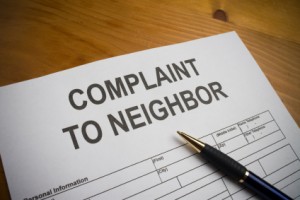 Property managers often get caught in the middle of disputes between neighbors. Whether the feuding neighbors are tenants or homeowners, property managers need a plan to deal with these disputes. It is not uncommon for these disputes to escalate and result in litigation. Emotions in these cases usually run high. So, an important goal for the property manager is to focus on a comprehensive resolution while avoiding being named in the lawsuit. For example, there have been cases in which a property manager was sued for housing discrimination for taking action that was seen as biased against a racial minority tenant, even though the other tenant was in the right. Obviously, having a plan to address tenant disagreements reduces the chances of such results. Here are some things to consider when developing such a plan:
Property managers often get caught in the middle of disputes between neighbors. Whether the feuding neighbors are tenants or homeowners, property managers need a plan to deal with these disputes. It is not uncommon for these disputes to escalate and result in litigation. Emotions in these cases usually run high. So, an important goal for the property manager is to focus on a comprehensive resolution while avoiding being named in the lawsuit. For example, there have been cases in which a property manager was sued for housing discrimination for taking action that was seen as biased against a racial minority tenant, even though the other tenant was in the right. Obviously, having a plan to address tenant disagreements reduces the chances of such results. Here are some things to consider when developing such a plan:Rely on the Contract
Property managers should first be guided by the contract between the feuding neighbors. In a rental context, the contract is the lease agreement that, if properly written, addresses the use of common areas, the use of the rental units itself, and the creation and enforcement of rules. Look to the lease first.
In a condominium or PUD, the contract is the neighborhood covenants, by-laws for the homeowners association, plat restrictions and the like. Again, look to these contract documents first. The solution to resolving a dispute often rests within the obligations and rights outlined by these documents. No guess work by the property manager is required in most cases.
In a condominium or PUD, the contract is the neighborhood covenants, by-laws for the homeowners association, plat restrictions and the like. Again, look to these contract documents first. The solution to resolving a dispute often rests within the obligations and rights outlined by these documents. No guess work by the property manager is required in most cases.
Rely on the Law
In the absence of a contractual provision that would aid management in resolving a dispute, there might be a federal or state law, or local ordinance that controls the matters in dispute. Call your lawyer to determine what, if any, laws might apply.
Rely on Your Lawyer
A wise property manager will consult with legal counsel early and often to bring disputes to early conclusions, to avoid mistakes, to get lawful results and to minimize liability risks to the property manager.
Rely on the Courts
In the end, you cannot rely on neighbors to be reasonable or to resolve their differences amicably. We hope they do, but you cannot rely on a neighbor-driven resolution. In rare cases, property managers must turn matters over to the courts by initiating lawsuits. Sometimes, that means filing lawsuits against contractors, guests and other third parties. Again, consult with an attorney experienced in these matters early so that management does not foreclose on any of its rights or options.
Document. Document. Document.
It is important for property managers to make notes during or immediately after events relating to a dispute. In some cases, those notes can become evidence in a lawsuit. Letters, emails, and text, telephone and voice mail messages also can become evidence. Notes and correspondence between the property manager and legal counsel should be kept separately, in order to protect anything that might constitute an attorney-client communication.
Be Patient. It’s Not Your Battle.
Finally, property managers should be patient and methodical in resolving these disputes. The feuding neighbors are already emotional. If the property manager keeps a “cool head,” then there is an increased chance that the manager can effectuate a positive result.